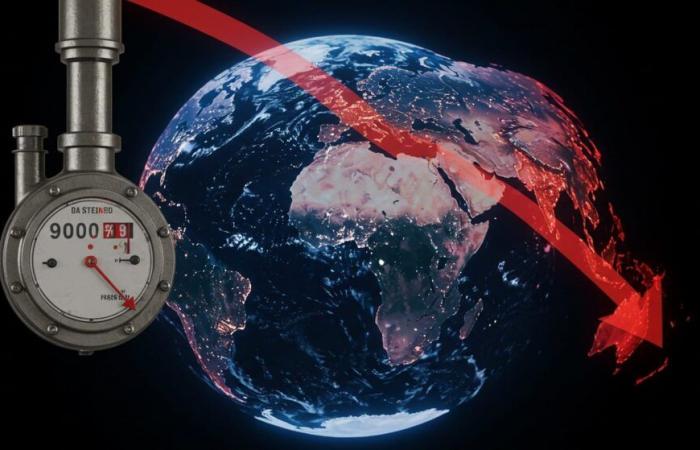The gas prices drop by 6.4 % on May 1, good news for 2.5 million households. But will this drop last in the face of geopolitical tensions?
Imagine opening your gas bill and discovering, for the first time in months, a significant drop. This May 1, 2025 is reality for millions of homes: gas prices decrease by 6.4 %. A breath of fresh air, but for how long? Between fluctuations in markets and geopolitical uncertainty, this lull could only be a break in an energy storm.
An expected, but fragile drop
After months of uninterrupted increases, the news of a drop in gas prices has something to delight. The reference rate, which serves as a compass for suppliers, goes to 14,277 cents TTC per kilowatt hour. This decrease, announced by the regulatory authorities, reflects a favorable economic situation, but the experts remain cautious. The subscriptions remain stable, with an average annual cost of 114.30 euros for cooking and hot water, and 277.43 euros for the heating included.
For the 2.5 million households concerned, this drop represents a significant economy. But behind this figure hides a complex reality: the energy markets are unpredictable, and international tensions could quickly reverse the trend.
Why do prices drop?
Several factors explain this decrease. First, a temporary stabilization gas supplies. European stocks, well filled after a mild winter, exert a downward pressure on prices. Then, competition between suppliers plays a key role: by aligning the reference rate, they seek to attract or retain customers.
“This drop is good news, but it is based on fragile balances. A conflict or a supply of supply can change everything. »»
An energy market analyst
Finally, the data transmitted by the network managers, scrutinized each month, made it possible to adjust the prices downwards. But this mechanism, although rigorous, is not immune to global upheavals.
Geopolitical threats on the horizon
If the current drop is a boon, it could be short -lived. THE Geopolitical crises weigh heavily on the energy markets. Take the example of tensions in the Middle East or uncertainties around Russian gas deliveries. A simple disturbance in the supply chains can flambé prices.
To better understand, here are the main risks:
- Regional conflicts : Tensions in producing areas, such as the Middle East, threaten exports.
- International sanctions : Restrictions on certain exporting countries reduce the global supply.
- Climate and disasters : Extreme weather conditions can disrupt production or transport.
These uncertainties remind you that gas, although Essentiel, remains a vulnerable resource for global vagaries.
What impact for homes?
For households, this decline results in an immediate reduction in the bill. An average home using gas for heating could save several tens of euros per year. But this economy must be put into perspective: the past increases have increased budgets, and many remain cautious.
Here is an overview of current costs for a gas subscription:
| Usage | Annual cost (euros) |
|---|---|
| Cooking + hot water | 114,30 |
| Cooking + hot water + heating | 277,43 |
These figures, although stable for the moment, could evolve if prices go upwards. Foyers are therefore invited to monitor their consumption and compare supplier offers.
How to take advantage of this drop?
To make the most of this decrease, here are some practical tips:
- Compare suppliers : Some offer lower rates for the reference price.
- Optimize your consumption : Reduce heating or invest in better insulation.
- Follow the news : Stay informed of market developments to anticipate any increases.
In parallel, some households turn to alternatives, such as heat pumps or renewable electricity, to reduce their gas dependence. A strategy that, although costly in the short term, can be profitable in the long term.
A market under close surveillance
The regulatory authorities play a crucial role in stabilization of prices. Each month, they analyze the data from network managers to adjust the prices. This well -established mechanism guarantees a certain transparency, but it cannot predict everything.
“Consumers must remain vigilant. Energy markets are a complex puzzle, and each piece counts. »»
An expert in energy regulation
In addition, European governments seek to diversify their sources of supply to reduce their dependence on certain countries. Projects such as liquefied natural gas terminals (LNG) or partnerships with new producers are underway, but their impact will not be visible in the medium term.
And after? Possible scenarios
What does the future have in store for us? Several scenarios are emerging:
Optimistic scenario : Supplies remain stable, and prices continue to lower thanks to increased competition.
Pessimistic scenario : A geopolitical crisis or a supply of supply increases the prices, canceling the current gains.
Intermediate scenario : Prices fluctuate moderately, with increases and seasonal drops.
For consumers, uncertainty remains the watchword. One thing is certain: the energy transition, with a turn to more sustainable sources, becomes a priority to limit the impact of these fluctuations.
Gas in the energy transition
Gas, although there is no time, is not a solution for the future. Experts agree that its role must decrease in favor of renewable energies. But this transition takes time, and in the meantime, households remain dependent on price variations.
Initiatives exist to support this change. For example, financial aid encourages the installation of more ecological systems, such as high performance boilers or solar panels. These solutions, although costly for purchase, reduce the long -term energy bill.
In the meantime, gas remains a pillar of energy consumption. Its current, welcome decrease, should not make you forget the challenges to come. Consumers, suppliers and governments must work together to sail in this uncertain landscape.
In conclusion, the drop in gas prices in May 2025 is good news, but it does not guarantee sustainable stability. Households must remain vigilant, optimize their consumption and consider alternatives to protect themselves from future increases. In a world where energy is at the heart of geopolitical and environmental issues, each economy counts, but caution remains in order.








